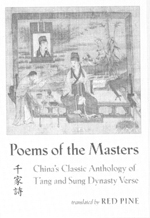POEMS OF THE MASTERS:
China’s Classic Anthology of T’ang and Sung Dynasty Verse
Translated by Red Pine (Bill Porter)
Port Townsend, WA: Copper Canyon Press, 2003
480 pp.; $18.00 (paper)
Midway through the thirteenth century, near the close of the Sung dynasty, a prolific poet, Liu K’o-chuang, compiled a collection of poems that served as China’s preeminent anthology until the 1970s, when cadres of the Cultural Revolution replaced it in the classroom with proletarian propaganda. TheChien-chia-shih, rearranged several times over the centuries as poems were added and deleted, now holds 214 poems. Tu Fu, Li Pai (Li Po), Wang Wei, and all the renowned Chinese rogue poets are represented. For Poems of the Masters, the first full edition in English, Red Pine, the prolific, coyotelike translator of Chinese texts for North America, has composed crisp, insightful commentaries to each of the verses, which also appear in their original Chinese.
China’s classical poetry holds an arresting lucidity for North Americans. In translation these poems seem to reflect our patterns of thought better than classical English poetry does. The tone of the Chinese verse is intimate—one utterly vulnerable, disarming, beloved friend speaking to another. And because the nearly seven hundred years covered by this anthology—spanning the seventh through the thirteenth centuries—saw terrific political unrest across China, these poems are a collective cry of upheaval, exile, banishment, loneliness, fear of war, and fear of death. The most moving ones, and there are dozens, speak of the separation of friends, or of the poet’s plaintive look homeward to a place he has not seen in years and, perhaps, doubts he will ever see again.
Chinese classical verse carries, with a very particular flavor, the Buddhist notion of impermanence, as well as a Taoist conviction for the inevitability of change. In Poems of the Masters, I was enormously struck by several poems in which all the anguish and longing of separation come to focus on the overhead moon. “The Chinese are fond of saying the same moon shines on those who are apart, thus joining them together,” Red Pine writes in his commentary on a well-known four-line poem by Wang Wei. And there is Li Pai’s bravely understated lyric:
Before my bed the light is so bright
it looks like a layer of frost
lifting my head I gaze at the moon
lying back down I think of home
A week after reading that verse, as August’s full moon was fading, I took an evening walk in Colorado’s Rocky Mountain foothills with my fifteen-year-old daughter, Althea. She was feeling acutely her separation from dear companions two thousand miles away on the East Coast. Suddenly, without guile, she echoed the T’ang sensibility: “I can’t believe we all look up and see the same moon.” Her words took my breath away. Poetic images move quickly, but the heart—who can catch it? It was as though Althea were standing in the moonlight alongside Wang Wei, Li Pai, Liu Han, and Tu Ch’ang.
In elevating poems of friendship to an art of devastating clarity, the classical Chinese poets caught the melancholy—what we call “the blues”—that other cultures channeled into love poetry. And in the moon’s insoluble clarity they found a reflection of far-off loved ones. As Red Pine reiterates in commenting on the Li Pai poem: “When the Chinese see the moon, it reminds them that friends and family members living elsewhere are looking at the same moon.” This explains why Li Pai, living a life of sad exile after drunkenly composing a series of poems that enraged the Emperor’s girlfriend (one is included in this book), is said to have drowned, drunk, trying to embrace the moon’s reflection in a pond.
Another poem by Li Pai concludes, “if only a host can keep his guests drunk / they’ll soon forget about their hometowns.” Clearly alcohol was insufficient, in the end, to bring Li Pai such oblivion. And the Buddhist and Taoist teachings he knew of seem to have added sting to his loneliness, rather than solace.
How little in human experience has changed through the centuries! “When it’s in the heart, it’s chih (life-force), when it’s in language, it’s shih (poetry),” reads the preface to an earlier collection of Chinese verse. Red Pine, in his fine introduction to this volume, observes that the Chinese character for “poetry” is composed of two elements: one meaning “language”; the other, “from the heart.” Perhaps it is no accident that the Ch’an Buddhist masters—close friends of the T’ang and Sung poets, often hosting them in their hermitages—adopted the moon as their singular image for enlightenment. Did they, too, ride that crest of moonlight, melancholy, and inconsolable longing?
No other object in shared human experience carries such hope, so much yearning. Step out tonight and look at the autumn moon. Then light a lamp and read from this collection.